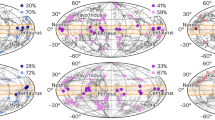Abstract
By means of high-resolution N-body simulations in a ΛCDM cosmology, we verify that scaling relations similar to those observed for nearby galaxy clusters are also defined by their dark matter hosts; the slopes, however, are not the same. We then show that the scaling relations of galaxy clusters can be explained as the result of the cosmological collapse of density fluctuations at the appropriate scales, plus a systematic trend of the M/L ratio with cluster mass. The empirical fact that the exponent of the Faber-Jackson relation of elliptical galaxies is significantly different (higher) than that of clusters, force us to conclude that the galaxy scaling laws might derive from the cosmological collapse of density fluctuations at the epoch when galactic scales became non-linear, plus modifications afterward due to early-time dissipative merging.
Similar content being viewed by others
Author information
Authors and Affiliations
Editor information
Rights and permissions
About this paper
Cite this paper
Lanzoni, B., Ciotti, L., Cappi, A., Tormen, G., Zamorani, G. Clues on Galaxy and Cluster Formation from Their Scaling Relations. In: Renzini, A., Bender, R. (eds) Multiwavelength Mapping of Galaxy Formation and Evolution. ESO Astrophysics Symposia. Springer, Berlin, Heidelberg. https://doi.org/10.1007/10995020_83
Download citation
DOI: https://doi.org/10.1007/10995020_83
Published:
Publisher Name: Springer, Berlin, Heidelberg
Print ISBN: 978-3-540-25665-6
Online ISBN: 978-3-540-31641-1
eBook Packages: Physics and AstronomyPhysics and Astronomy (R0)




